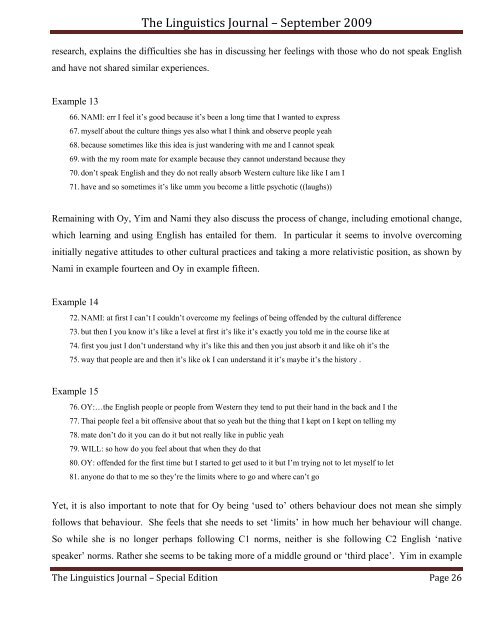The Linguistics Journal September 2009 Special Edition Language
The Linguistics Journal September 2009 Special Edition Language
The Linguistics Journal September 2009 Special Edition Language
You also want an ePaper? Increase the reach of your titles
YUMPU automatically turns print PDFs into web optimized ePapers that Google loves.
<strong>The</strong> <strong>Linguistics</strong> <strong>Journal</strong> – <strong>September</strong> <strong>2009</strong><br />
research, explains the difficulties she has in discussing her feelings with those who do not speak English<br />
and have not shared similar experiences.<br />
Example 13<br />
66. NAMI: err I feel it’s good because it’s been a long time that I wanted to express<br />
67. myself about the culture things yes also what I think and observe people yeah<br />
68. because sometimes like this idea is just wandering with me and I cannot speak<br />
69. with the my room mate for example because they cannot understand because they<br />
70. don’t speak English and they do not really absorb Western culture like like I am I<br />
71. have and so sometimes it’s like umm you become a little psychotic ((laughs))<br />
Remaining with Oy, Yim and Nami they also discuss the process of change, including emotional change,<br />
which learning and using English has entailed for them. In particular it seems to involve overcoming<br />
initially negative attitudes to other cultural practices and taking a more relativistic position, as shown by<br />
Nami in example fourteen and Oy in example fifteen.<br />
Example 14<br />
72. NAMI: at first I can’t I couldn’t overcome my feelings of being offended by the cultural difference<br />
73. but then I you know it’s like a level at first it’s like it’s exactly you told me in the course like at<br />
74. first you just I don’t understand why it’s like this and then you just absorb it and like oh it’s the<br />
75. way that people are and then it’s like ok I can understand it it’s maybe it’s the history .<br />
Example 15<br />
76. OY:…the English people or people from Western they tend to put their hand in the back and I the<br />
77. Thai people feel a bit offensive about that so yeah but the thing that I kept on I kept on telling my<br />
78. mate don’t do it you can do it but not really like in public yeah<br />
79. WILL: so how do you feel about that when they do that<br />
80. OY: offended for the first time but I started to get used to it but I’m trying not to let myself to let<br />
81. anyone do that to me so they’re the limits where to go and where can’t go<br />
Yet, it is also important to note that for Oy being ‘used to’ others behaviour does not mean she simply<br />
follows that behaviour. She feels that she needs to set ‘limits’ in how much her behaviour will change.<br />
So while she is no longer perhaps following C1 norms, neither is she following C2 English ‘native<br />
speaker’ norms. Rather she seems to be taking more of a middle ground or ‘third place’. Yim in example<br />
<strong>The</strong> <strong>Linguistics</strong> <strong>Journal</strong> – <strong>Special</strong> <strong>Edition</strong> Page 26


